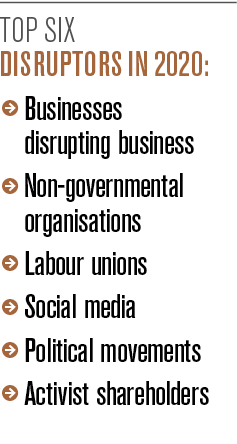
Disruption. It happens each and every day, making doing business increasingly complicated and uncertain, costing businesses money, and damaging brands and reputations. While disruption is perhaps an overused word, it is a reality and, now more than ever, business leaders must navigate an increasingly complex world. These disruptors are exacerbated by a globalised and interconnected economic environment and a constant news cycle fuelled by the increasing ubiquity of social media.
The net impact of this new normal on communications is straightforward: traditional communication techniques are no longer sufficient and, in some cases, can even be damaging. As such, companies and their leaders must change the way they communicate and interact with internal and external stakeholders, including employees, shareholders, customers, political leaders and financial institutions.
Companies and executive leadership need to understand that they are not always right, and sometimes they need to change their practices
What lies ahead
In my view, there are six top disruptors that companies and senior business leaders should watch out for in 2020. The first is the fact that businesses are disrupting business. Think about it: Netflix, Airbnb, Uber, Venmo and Casper are all disrupting established industries through technological advancements, ingenuity and innovation.
Another disrupting force is non-governmental organisations. They have been disrupting for years, using strong images and deploying tactical actions to shock the general public and pressure companies and governments to change. For example, Extinction Rebellion continues to disrupt business and is particularly vocal on taking action on climate issues.

Since Europe’s Industrial Revolution in the 18th century, labour unions have been using disruptive tactics to demand change from industry, governments and private organisations. Such techniques are still getting mileage, as demonstrated by the strikes in France that began in December 2019. The strikes, which were sparked by pension reforms, heavily disrupted daily life in France, indicating the detrimental effect such action can have on organisations and the general public.
Social media has gained traction of late, and its disrupting force is only increasing. A small misstep on social media can become global news within hours, undoing decades of work creating strong reputations. Moreover, social media holds businesses to account and gives consumers immense power in a way they did not have before the advent of online platforms like Facebook, Twitter and Instagram.
To further complicate things, political movements have increasingly targeted politicians and institutions of all stripes. Fringe political parties have, for example, made significant electoral gains in many European countries and in the 2019 European elections. Their prominence is a disruption to the established political order, which is so critical to ensuring the smooth functioning of the marketplace.
Finally, activist shareholders are making their voices heard. According to a 2019 study by Activist Insight, in the first nine months of 2019, 712 major companies worldwide, including 117 in Europe, were publicly subjected to activist demands. This is likely to increase in 2020, creating new obstacles for corporate leaders and boards of directors.
While knowing what the disruptors are is important, business leaders need to understand how to respond and take back control.
Start the conversation
Companies and executive leadership need to understand that they are not always right, and sometimes they need to change their practices, not just their communications strategy. Agencies and in-house communication teams must not be afraid to ask direct and difficult questions of leadership. They must become bolder and better at convincing business leaders to implement radical strategic changes when necessary.
Ignoring problems does not make them go away. Thinking that an issue or crisis will disappear hardly ever works, and can seriously damage a reputation that may have taken years or even decades to establish. But it is also important not to overreact: having a video or post taken down often just increases its viral potential.
Business leaders must use clear and simple language – the fewer words the better – in order to resonate with most audiences. Complex, overly long statements will not be read and may be seen as an attempt to mask the truth. An evocative image says more than 1,000 words.
Additionally, the art of communication starts with leading the discussion, not responding to it. In the digital era, unidirectional communication is dead. A 2018 study by Muck Rack found that 53 percent of journalists do not use press releases to find a news story, with just three percent reporting that they heavily rely on them. Communication is no longer a one-way street; journalists, stakeholders and consumers expect a dialogue and want to be engaged. Be prepared and open to discussion.

Invest in success
Relationships are crucial in times of crisis, so it is important to think about and invest in the long term. When the pressure comes, it is too late to build a connection. The relationship that requires the most work is that with employees. They are a company’s greatest asset and its front line, so the leadership needs to engage them. If they cannot tell the company’s story, who will? Investing in them by building strong regional and localised relationships will ensure they can advocate and represent the company’s interests. These relationships will pay dividends if a company faces major issues, as the basis of the relationship is trust.
It’s also important to choose the best possible communications support. Working with innovative and creative experts who embrace transformative change will help leaders and companies navigate the labyrinth of disruptors. Good communications support will ensure the tired and broken communications model of the past will not be used. Business leaders must also be exposed to bold ideas and even bolder solutions, as they need unprecedented levels of insight and awareness to make the most important business decisions. And in those moments, do not let the lawyers control everything, which often occurs when facing disruptors.
Tell your story
One of the keys to rebuilding trust is to lead by example and ‘walk the talk’. Theoretical oratory will leave audiences unsure of your meaning: they need real and specific examples to remember the importance of what you say. It is essential to ensure your stakeholders understand how, why and what you are doing, and the way it will impact their lives. It is also about living your purpose in all communications. Do not let each turn of events define your purpose; it should be the other way around.
Now, more than ever, people are distrustful of companies and their motivations. According to a 2017 report by Accenture Strategy, 23 percent of customers trust companies less than they did five years previously. To help combat this, it is important to be authentic in what you say and always answer the question. Create a strategy with impact, deliver business results and live up to your purpose and vision. Disruption is going nowhere: embrace it.

